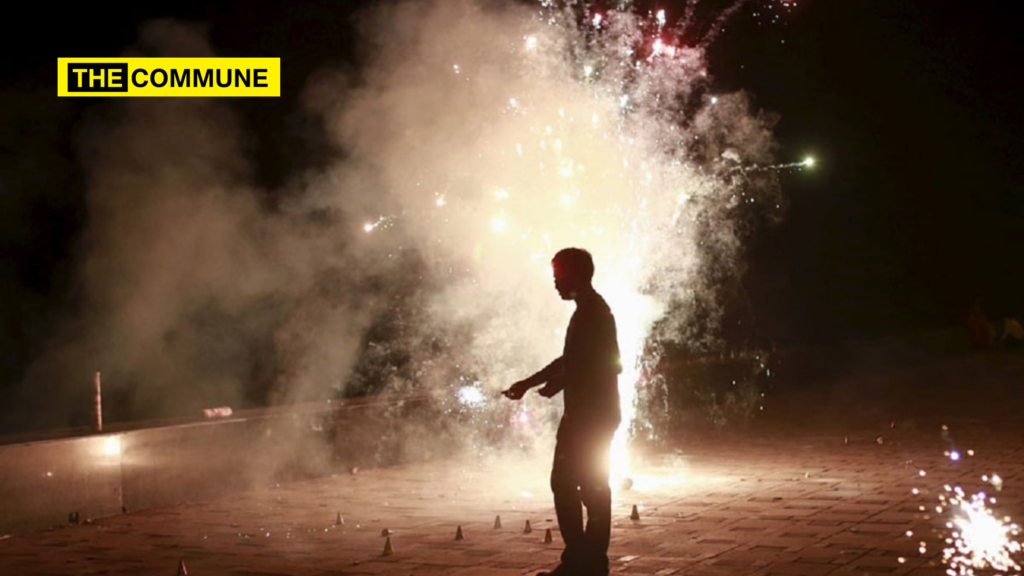Over the last few years, there have been several attempts by several ‘activists’ and lobbies to enforce a ban on crackers during Deebavali, citing air/noise pollution and ‘welfare’ of animals. This had already been a worry for the firecracker industry in Sivakasi, Tamil Nadu. The Wuhan virus pandemic and the announcements made by several state governments on a ban on bursting crackers pointing that it would lead to breathing trouble for COVID patients, has only added to their woes.
Now, the National Green Tribunal (NGT) on Monday (November 10) banned the sale and use of firecrackers across the country from November 9-10 till November 30-December 1 midnight in areas which fall under the ‘poor’ and ‘worse’ category. This has served as another death blow to the fireworks industry which has already been reeling under losses due to different factors.
Sivakasi in Virudhunagar district of Tamil Nadu accounts for nearly 90% of the country’s fireworks production and has more than 1,070 firecracker units in and around the city. The firecrackers manufactured in factories at Sivakasi are valued at nearly ₹2,500 crore while the retail sales are estimated at nearly ₹6,000 crore. This year the production is valued at nearly ₹1,800 crore.
The NCR, Punjab, Rajasthan and other north Indian states are the major firecracker markets that accounts for around 40% of the Sivakasi fireworks industry’s sales. It is estimated that the ban will cause a loss of ₹800 crore to the industry this year and will directly and indirectly affect 8 lakh workers proving fatal to the Sivakasi firecracker industry, which trades worth ₹3,500 crore annually. There are several other industries like printing, paper boards, among others, dependent on the firecracker industry employing lakhs of people. All these will be impacted with the ban on fireworks.
Today, those seeking ban say that bursting firecrackers causes air/noise pollution. Tomorrow, they will come up with the some finding and say that light emitted by fireworks causes injuries to eyes. It is the urban ‘educated’ bourgeoise that mouths these arguments while sitting in the comfort of the airconditioned rooms and travelling in automobiles which does much more harm to the environment.
The argument that bursting firecrackersduring Deebavali is a no brainer as unlike the automobile pollution, the firecracker emissions are not dangerous and soon disperse in the air. Also, with COVID being repeatedly cited as the reason, it is to be noted that the Ram Mandir Bhoomi Pujan saw entire Uttar Pradesh celebrating with fireworks when the number of cases were on the rise. Now, the blanket ban makes no sense as the cases too have been on the decline.
Firecracker manufacturers in Sivakasi say the demand for firecrackers has dropped by 35% since the onset of the Wuhan virus outbreak and that states like Goa, Maharashtra, Andhra Pradesh and Karnataka have not been able to buy large quantities of firecrackers during Ganesha Chaturthi this year. Also, with festivals and weddings that happen with great pomp and show getting toned down in celebrations, it has severely impacted sales.
With just a few days to go for Deebavali, many vendors are said to be canceling orders as many states continue to ban the firing and sale of firecrackers even after issuing licenses for sale. It is feared that the firecracker industry will suffer irreparable losses if this continues.
The industry has already been impacted by National Green Tribunal’s order on manufacturing ‘green fireworks’. Fireworks manufacturer associations lament that all the money, time and effort in producing green firecrackers this year as per the orders of the NGT has now gone in vain.
The loss to the firecracker industry is likely to affect the livelihoods of thousands of workers who have for generations involved themselves in this profession with no skilling in any other profession.
While there has been a lot of talk about making India ‘Atmanirbhar’, there seems to be incoherence in policies between the Centre and State governments in promoting native labour intensive industries. With the crackdown on Chinese fireworks domestically and a strong anti-China sentiment across the world, Sivakasi has the potential to become a world player in fireworks. Nowhere in the world has any country banned fireworks during the Wuhan virus while celebrating their festivals. However, the short-sighted move of several state governments and the NGT has dampened not just the fireworks but also the prospects of an Atmanirbhar Bharat.
(With inputs from IANS)

